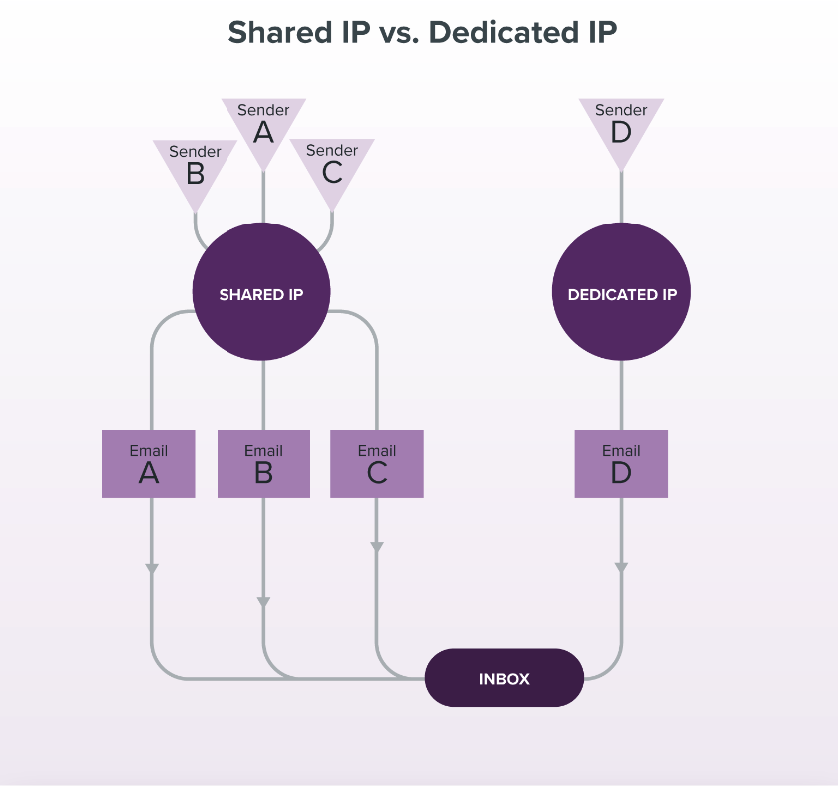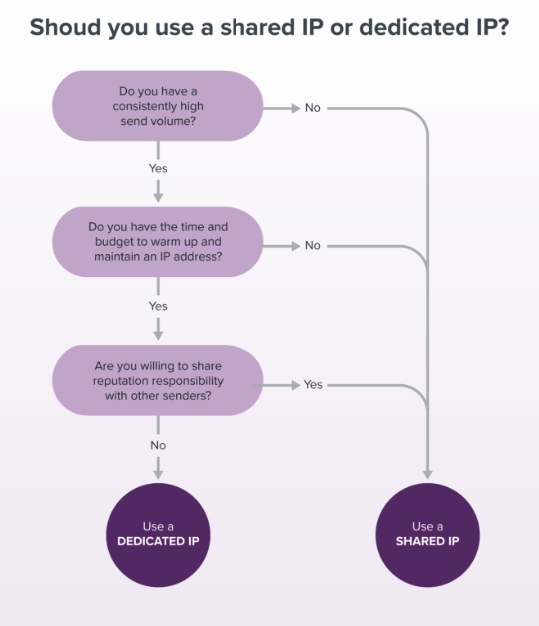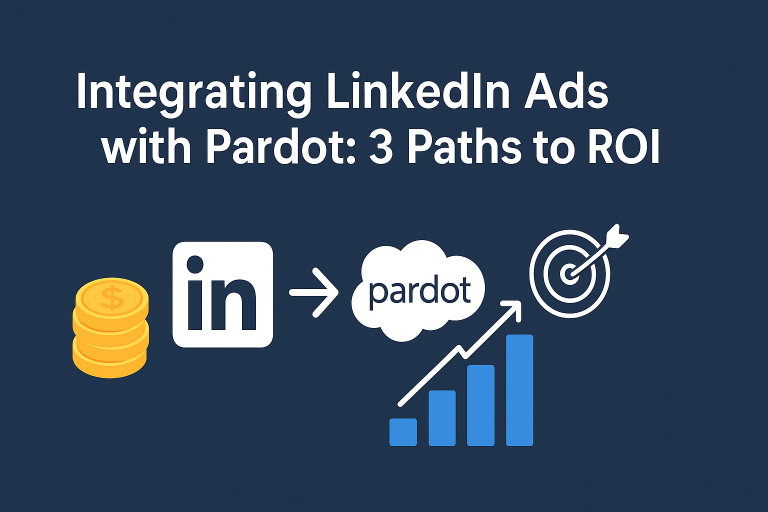Dedicated IP vs. Shared IP | How They Affect Email Deliverability
There are a lot of decisions to make when you’re setting up an email program, and one of the most important is whether to use dedicated or shared IPs.
Both have their pros and cons, so it can be tough to decide which is right for your business.
In this article, we’ll break down what dedicated IPs are and when you should consider using them. We’ll also look at the benefits of using a shared IP address and how to decide if it’s right for your company.
What is a Dedicated IP?

Dedicated IP is an IP address that is set aside for your exclusive use. It’s not shared with any other organization, which means you’ll have full control over it and won’t have to worry about other companies clogging up your inbox or affecting your deliverability rates.
This can be a great option for businesses that want to send a large volume of emails or that have a high spam complaint rate. Dedicated IPs can also help improve your sender reputation and increase the chances that your messages will be delivered to the inbox.
However, Dedicated IPs can be expensive and they require a fair amount of maintenance. You’ll need to set up SPF and DKIM records, create a feedback loop, and keep an eye on your blacklist status. If you’re not comfortable handling all of this yourself, you may want to consider using a third-party email service provider.
Pros:
- dedicated IP looks like an option to ensure you have more control over your IP reputation.
- since you’re the only company sending email from an IP address, you have total transparency and control over maintaining IP reputation, and as an extension, your deliverability
- If you’re the only company sending email from an IP address, and you’ve proven reliable in the past, organizations may safelist you
Cons:
- the full weight of your IP reputation lies on your shoulders
- you need to warm up the IP address (and keep it warm)
- dedicated IPs require more time and money
What is a Shared IP?
A shared IP is an IP address that is used by more than one company. It’s a great option for businesses that want to save money and don’t have the resources to manage a Dedicated IP.
Shared IPs are also a good choice for businesses that are just starting out or that have a low spam complaint rate. This is because using a shared IP can help improve your sender reputation and increase your chances of being delivered to the inbox.
However, there are a few things to keep in mind when using a shared IP address. First, you’ll need to make sure you’re sending spam-free content or you could hurt the reputation of the entire pool. You’ll also need to keep an eye on your blacklist status and make sure you’re not causing any problems for other companies using the same IP address.
Pros:
- shared IP addresses are less expensive than Dedicated IPs
- they can improve your sender reputation, which can increase your chances of being delivered to the inbox
Cons:
- you have less control over your IP reputation
- your deliverability can be impacted by other companies that are sending from the same IP address
- you need to make sure you’re not sending anything that could hurt the pool’s sender reputation.
How a Dedicated IP Affects Email Deliverability
A business having a dedicated IP address means only that specific business is responsible for their reputation. If a company makes one mistake (using a bad link in an email, not following proper IP warming practices, etc.), it will have repercussions for a while. If the business does something to hurt their reputation with the ISPs, it will take time for them to regain their trust as a sender. This, in turn, affects inbox placement and deliverability.
If an IP address lands on a blacklist or hits a large amount of spam traps, it’s nobody else’s fault except that one business’s. This makes it easier for them to figure out the cause.
An ISP uses sending reputation to choose whether or not to deliver the message to the inbox.
A dedicated IP address becomes white-listed easier than a shared ISP.
Spam filters identify white-listed senders as ‘safe senders.’ Therefore, a sender on a whitelist passes through spam filters much easier than someone who isn’t whitelisted. For example, asking AOL to whitelist a dedicated IP address will increase the chances of an approval, as opposed to a sender who has multiple shared IP addresses asking to be white-listed.
Note: Don’t think that being whitelisted is permanent. Sending practices can always get a sender removed.
Using a dedicated IP can also affect one’s deliverability in another way: sole ownership in DNS records. DNS records point right back to the brand. For example, if someone were to perform a reverse DNS lookup on a company’s dedicated IP address, it would have information that is associated with that company’s brand only.
Each blacklist filters differently. After landing on a blacklist, figure out the problem, and avoid making the same mistakes in the future. Fixing an issue and repeating it both have contrasting effects on deliverability. And fixing an issue and then repeating it hurts deliverability on a whole different level. However, fix the issues and avoid them in the future to increase reputation.
- One holds responsibility for their own reputation.
- A dedicated IP joins a whitelist easier than a shared IP.
- One possesses sole ownership in DNS records.
How a Shared IP Affects Email Deliverability
Shared IPs involve sharing reputation. Just like the dedicated description, this can be a good or bad thing. This depends on the type of IP pool the senders are in and the type of senders that are sharing the IP address. While more cost effective, a shared IP address increases the chances of hitting more spam traps. In addition, the chances increase with each additional company who shares the IP address. This uncertainty is why ISPs typically reject adding shared IP addresses to whitelists. And as a result of not being on a whitelist, the senders in the shared IP address have a harder time passing the spam filter.
As part of a shared IP, DNS records don’t point back to just one company. Being part of a shared IP means the IP groups the DNS records, as well.
If you are a lower volume sender, a shared IP address may be just right for your company because you won’t have to worry about the amount of spam trap hits versus your reputation taking a plummet because of the hits.
What Next Steps Can I Take?

Several factors come into play when a company decides whether to use a dedicated or shared IP.
First, look at the total volume of emails sent each month. Then ask if it is worth obtaining a dedicated IP address?
Review the content and how the company acquires email lists. Start following best practices if they are not already implemented. Weigh out the pros and cons of both shared and dedicated IP addresses. If a shared IP feels like the right choice, research the IP pool you are in and how your ESP groups their users.
- Look at the volume of emails sent.
- Factor in the budget.
- Examine contact acquisition.
- If selecting a shared IP, research your pool and the ESP groups/users.
Choose a dedicated IP if you have a ‘high sending volume,’ want to be in control of how your reputation develops, have sole responsibility in your DNS records, and have a larger budget. For a shared IP, research the group you are in because your chances of hitting more spam traps and blacklists increase with the amount of companies using the IP address. It will be harder to whitelist a shared IP, and DNS records don’t point back to just your company. However, this option is nicer for a smaller budget. Whichever IP you decide to choose, make sure to factor in all of the variables above. This one decision can have a large impact on your reputation with ISPs.
Ultimately, Dedicated and Shared IPs both have their advantages and disadvantages. Consider carefully what your needs are before deciding which is best for you. Do some research on different Email Service Providers (ESPs) to get a better understanding of what they offer and if Dedicated or Shared IPs would be appropriate for your program.
I hope that the info presented in this post will help you to make an informed decision about which option works best for your business.







